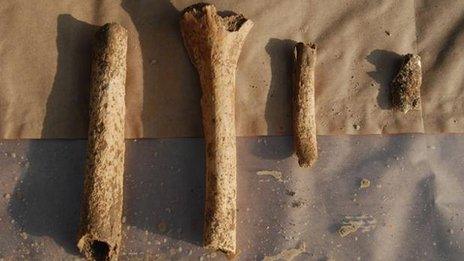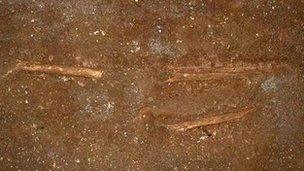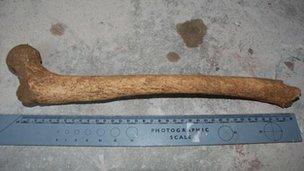What happens if you find human remains in your garden?
- Published

All discovered human remains must be reported to the coroner's office
When a set of bones was discovered at a property in Dorset this month, experts confirmed they were "bones of antiquity". But what happens when you find human remains in your back garden?
Imagine you have got the builders in and they are digging up your garden.
Then suddenly work stops, and the contractors tell you they have uncovered a set of bones.
This is what happened to a woman from Preston, near Weymouth, who was having an extension built.
The news would probably trigger a whirlwind of questions: Are the bones animal? Are they human? And if so - are they ancient or evidence of a recent murder?
Most pertinently, what happens next?
"It's very simple," said Matthew Roe, crime scene manager at Dorset Police.
"You need to stop whatever you're doing and call the police.
"In the first instance we will liaise with the CID [Criminal Investigation Department], then we will go down to make an initial and brief assessment."
'Mouldy old stick'
Mr Roe said householders would be free to inspect the bones "without being too intrusive".
In fact, he said, it may be a good idea to have a proper look at your discovery before you call the police.
"Sometimes we get there and it's a mouldy old stick," said Mr Roe.
"Sometimes people see something that is the right sort of shape, put two and two together and get 17".
Police have a certain amount of skills to assess whether the bones are human, but could need experts on hand.
Officers may also take photos of the bones to send over to experts before any more work is carried out.
In the case of the Preston bones, discovered on 9 February, police emailed images to a team of experts at Bournemouth University, who confirmed the bones looked human and went down to the site for further investigations.
They have now said they could date back to Roman times.
One of the team, biological anthropologist Elizabeth Craig-Atkins, said they were then able to determine whether bones were from recent times - and so be "a forensic case of interest to the police" - or more ancient.

The bones found in Preston, Dorset, were examined by experts at Bournemouth University
In this case police and experts decided the bones were "of antiquity", so would not form part of a criminal investigation.
Bones of antiquity then fall under the remit of the county archaeologist, who decide who will examine them further.
However, the Burial Act 1857 dictates that whoever exhumes human remains must have the correct licence to do so.
All human remains must also be reported to the coroner's office.
Afterlife burials
Those examining the bones will then clean them up and provide a report.
Dr Craig-Atkins said she would usually give cleaned bones a biological profile to assess their owner's age, gender, proportions, stature and any pathological conditions which could be identified on the skeleton.
And while police have said the general likelihood of discovering human remains is very limited, south Dorset is known to be rich in ancient burial sites.
"From what we understand of the environment around Weymouth, there is a lot of Iron Age and Romano British activity in that area," said Dr Craig-Atkins.
Dr Martin Papworth, a National Trust archaeologist for the South West, said he believed south Dorset had the greatest concentration of burial mounds in England.
"The South Dorset Ridgeway between Dorchester and Weymouth has the greatest density," he said.
"It has a massive Bronze Age burial system."

Once cleaned, bones of antiquity are assessed by experts
In terms of Iron Age burial sites, the Durotriges, a Celtic tribe living in Britain before the Roman invasion, had a distinctive funerary practice in the last decades of the 1st century BC to the end of the 1st Century AD.
"Late Iron Age Durotrigan-type burials are normally crouched with animal bones associated with them and normally with pots," he said.
"It's like an afterlife thing. They're put in a shallow grave with a joint of meat and they had the pots presumably with drinks or some other kind of food too."
The bones found in the garden at Preston were discovered in a shallow grave but experts have warned those who discover ancient human remains not to jump to conclusions.
Dr Craig-Atkins said: "Ground levels change over time, people can take ground levels off for creation of houses, so it's quite common to find archaeological burials at a whole variety of depths."
And if it is the case that any bones uncovered are of interest to the police or historical experts, Mr Roe said any planned renovation work on the site could be delayed.
He said: "It's that balance between not wanting to disrupt people's lives, but also showing a certain amount of respect to the remains."
- Published13 February 2012
- Published25 March 2011
- Published18 August 2011
- Published14 July 2011